

Commentary: It’s Facebook’s algorithm vs. democracy, and so far the algorithm is winning — NOVA Next. Over the last several years, Facebook has been participating—unintentionally—in the erosion of democracy.
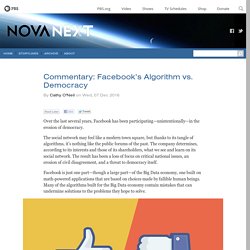
The social network may feel like a modern town square, but thanks to its tangle of algorithms, it’s nothing like the public forums of the past. The company determines, according to its interests and those of its shareholders, what we see and learn on its social network. The result has been a loss of focus on critical national issues, an erosion of civil disagreement, and a threat to democracy itself. Facebook is just one part—though a large part—of the Big Data economy, one built on math-powered applications that are based on choices made by fallible human beings. Many of the algorithms built for the Big Data economy contain mistakes that can undermine solutions to the problems they hope to solve.
Facebook's algorithm—driven in part by likes and shares—has upended civil discourse. In many cases, WMDs define their own reality to justify their results. Getting Out the Vote. How false news can spread - Noah Tavlin. Comment choisir vos informations - Damon Brown. How Search Works – Inside Search – Google. Facebook copyright notice hoax: How algorithms could stop misinformation. Photo illustration by Lisa Larson-Walker.
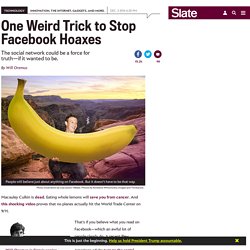
Photos by Kimberly White/Getty Images and Thinkstock. Macauley Culkin is dead. Eating whole lemons will save you from cancer. And this shocking video proves that no planes actually hit the World Trade Center on 9/11. That’s if you believe what you read on Facebook—which an awful lot of people clearly do. And yet Facebook’s news feed remains a hotbed of hoaxes, lies, and conspiracy theories. From a business perspective, media outlets have little cause to complain: Each of Slate’s short posts debunking that copyright notice has been shared tens of thousands of times, bringing the site some very easy traffic.
True, Facebook didn’t invent the viral hoax. Here’s the thing: It doesn’t have to be that way. Facebook will tell you it’s because distinguishing truth from lies is none of its business. The Breaking News Consumer's Handbook - On The Media Blog. MAN: Someone dressed in a black top, black jeans, what does that say, if anything, about a possible motive or, or whatever?
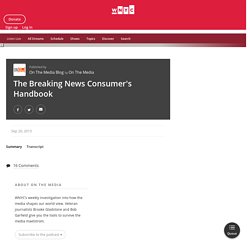
Can we begin to draw any initial conclusions? And I want to alert our viewers, sometimes these initial conclusions can, obviously, be very, very wrong. BROOKE GLADSTONE: The initial coverage of the mass shooting at the Washington Navy Yard Monday by contractor Aaron Alexis bore all the earmarks of classic reportage in the midst of these all too frequent horrors. It stunk. CORRESPONDENT: We’re looking at a situation possibly involving multiple shooters here at the Washington Navy Yard. BROOKE GLADSTONE: Wrong! CORRESPONDENT: It’s believed that whoever this gunman is, a man in his fifties who – is carrying three weapons, a handgun, a shotgun and an assault rifle. BROOKE GLADSTONE: Wrong about his age, wrong about the assault rifle. CORRESPONDENT: Earlier today, some media outlets were tweeting out that the shooter was a named Raleigh Chance. 10 Ways to Spot a Fake News Article - EasyBib Blog.
For many of us, 2016 is going down as a year to forget.
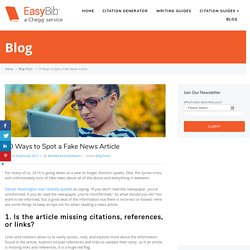
Election upsets, Zika, the Syrian crisis, and unfortunately tons of fake news about all of the above and everything in between. Denzel Washington was recently quoted as saying, “If you don’t read the newspaper, you’re uninformed. If you do read the newspaper, you’re misinformed.” So what should you do? You want to be informed, but a good deal of the information out there is incorrect or biased. 1. Links and citations allow us to easily access, read, and explore more about the information found in the article. News Use Across Social Media Platforms 2016. A majority of U.S. adults – 62% – get news on social media, and 18% do so often, according to a new survey by Pew Research Center, conducted in association with the John S. and James L.
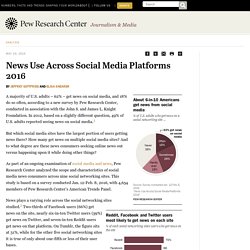
Knight Foundation. In 2012, based on a slightly different question, 49% of U.S. adults reported seeing news on social media. But which social media sites have the largest portion of users getting news there? How many get news on multiple social media sites? And to what degree are these news consumers seeking online news out versus happening upon it while doing other things? As part of an ongoing examination of social media and news, Pew Research Center analyzed the scope and characteristics of social media news consumers across nine social networking sites. News plays a varying role across the social networking sites studied. It is also useful to see how, when combined with the sites’ total reach, the proportion of users who gets news on each site translates to U.S. adults overall.
The audience overlap. Why the News Isn't Really the News [Epipheo.TV]